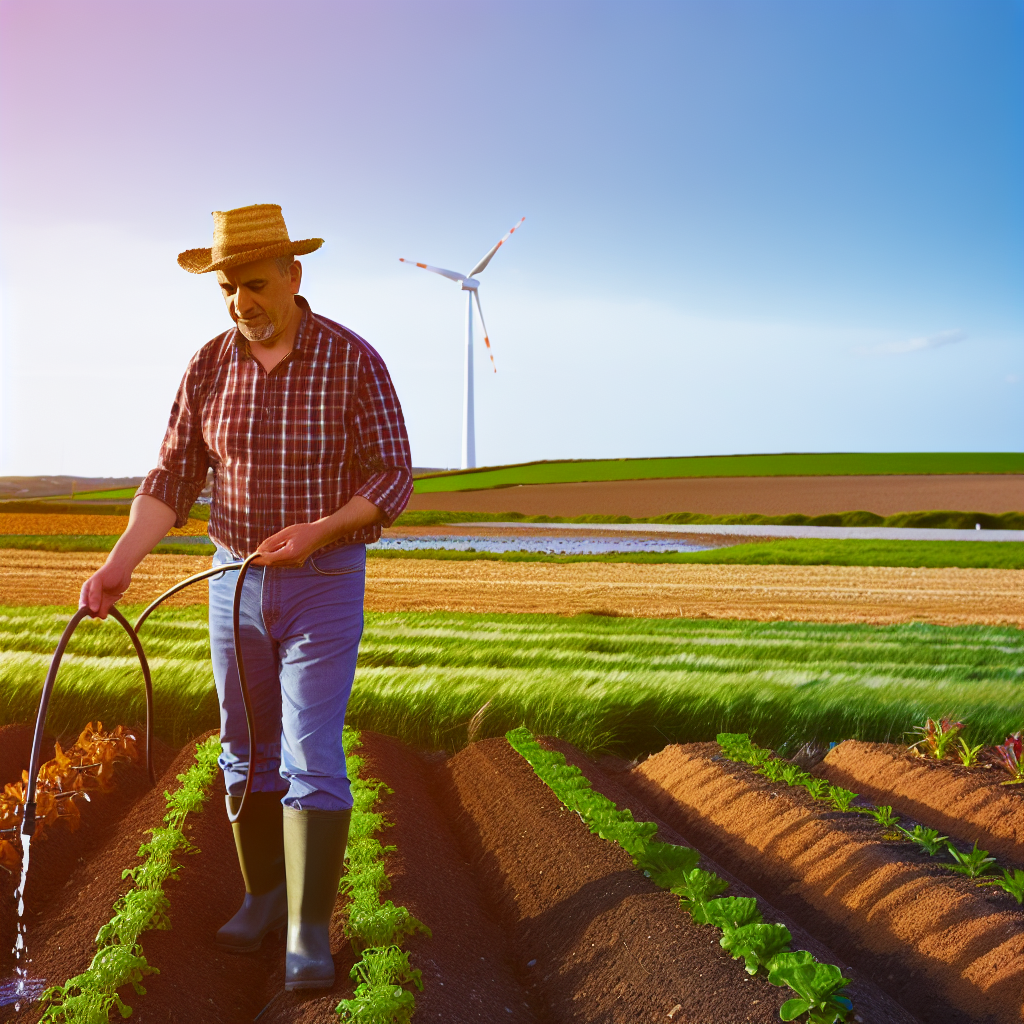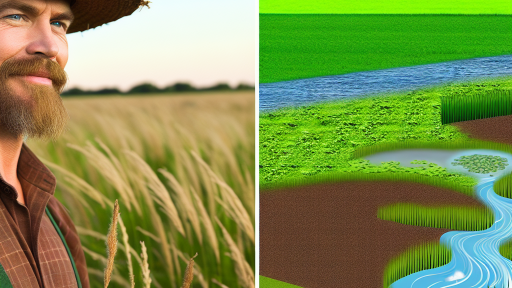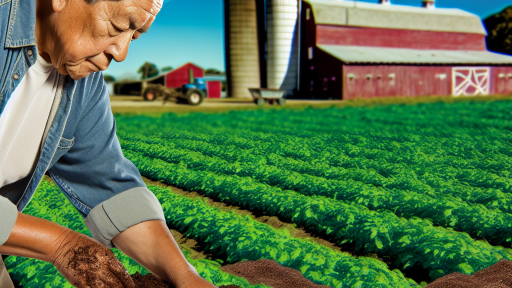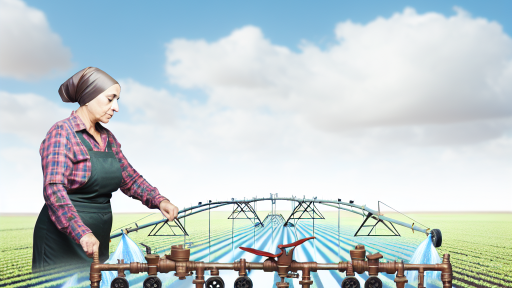Overview of Climate-Sensitive Farming Practices
Introduction to Climate-Sensitive Farming
Climate-sensitive farming focuses on sustainable agricultural methods.
These practices mitigate the impacts of climate change.
Farmers adopt techniques to enhance resilience and productivity.
Soil Health Management
Maintaining soil health is crucial for productive farming.
Farmers use cover crops to prevent soil erosion.
Moreover, soil amendments improve nutrient availability.
- Composting enhances organic matter in the soil.
- Crop rotation diversifies plant families to reduce pests.
- No-till farming minimizes disturbance to soil structure.
Water Conservation Techniques
Water management plays a vital role in climate-sensitive farming.
Irrigation practices are optimized for efficiency.
Drip irrigation reduces water waste and improves crop yields.
- Rainwater harvesting systems capture necessary rainfall.
- Contour farming reduces runoff and conserves moisture.
- Mulching protects soil and retains moisture effectively.
Crop Diversity and Selection
Diverse cropping systems increase ecosystem resilience.
Farmers select crop varieties that withstand extreme weather.
This reduces dependency on single crops and enhances food security.
- Intercropping increases biodiversity and pest control.
- Planting heirloom varieties preserves genetic diversity.
- Integrating agroforestry improves habitat for beneficial organisms.
Pest and Disease Management
Managing pests sustainably is essential for climate-sensitive farming.
Integrated Pest Management (IPM) minimizes chemical use.
Farmers utilize biological controls to manage pest populations.
Transform Your Agribusiness
Unlock your farm's potential with expert advice tailored to your needs. Get actionable steps that drive real results.
Get Started- Encouraging beneficial insects helps control pests naturally.
- Crop rotation disrupts pest life cycles.
- Using resistant crop varieties reduces reliance on pesticides.
Community and Knowledge Sharing
Building a community around climate-sensitive practices fosters resilience.
Farmers share experiences and knowledge through local networks.
Participating in workshops enhances best practices in agriculture.
- Local cooperatives provide resources for sustainable methods.
- Farm tours showcase successes and innovations in farming.
- Online platforms enable sharing techniques and results globally.
Economic Benefits of Climate-Sensitive Farming: A Cost-Benefit Analysis
Enhancing Crop Resilience
Climate-sensitive farming adapts crops to changing environmental conditions.
This leads to better yields in unpredictable climates.
Additionally, resilient crops require less water and fewer chemical inputs.
As a result, farmers save money on irrigation and pesticides.
Reducing Agricultural Costs
Implementing sustainable practices can lower production costs significantly.
Crop rotation and cover cropping improve soil health.
Healthy soil reduces the need for fertilizers.
Moreover, lower input costs enhance profit margins for farmers.
Increasing Access to New Markets
Climate-sensitive farming practices align with consumer demand for sustainability.
This alignment opens up new markets for farmers.
Examples include organic produce and sustainably sourced foods.
Farmers can access premium prices in these markets.
Mitigating Economic Risks
Adopting climate-sensitive practices reduces the risks associated with extreme weather.
Farmers face fewer crop failures and financial losses.
Additionally, diverse cropping systems can spread risk across multiple products.
This leads to more stable incomes year over year.
Government Incentives and Support
Many governments offer financial support for sustainable farming practices.
Incentives may include grants, subsidies, or low-interest loans.
Such support can significantly offset the initial costs of transitioning.
Moreover, participation in these programs boosts the farmer’s reputation.
Long-term Environmental Savings
Climate-sensitive farming reduces the environmental damage associated with traditional agriculture.
Showcase Your Farming Business
Publish your professional farming services profile on our blog for a one-time fee of $200 and reach a dedicated audience of farmers and agribusiness owners.
Publish Your ProfileBy lowering carbon emissions, farmers contribute to climate change mitigation.
This shift can lead to long-term savings on environmental restoration costs.
Ultimately, sustainable farming is an investment in a healthier planet.
Case Studies: Successful Implementations of Climate-Sensitive Farming
Implementing Agroecology in Spain
In rural Spain, farmers embraced agroecological practices.
They integrated indigenous crops into their planting strategies.
This method improved soil health and biodiversity.
Consequently, farmers reported higher crop yields and resilience.
The community also enjoyed a more stable economy.
This success inspired neighboring regions to adopt similar practices.
Innovations in Brazil’s Coffee Industry
The coffee farmers in Brazil adopted climate-sensitive techniques.
They implemented shaded coffee plantations to reduce sun exposure.
This approach protected plants from extreme temperatures.
Moreover, it enhanced coffee quality and flavor.
Farmers noted a positive impact on ecosystem health.
As a result, the industry became more sustainable and profitable.
Vertical Farming in Urban Centers
Urban farms in New York City embraced vertical farming technology.
This innovative method maximizes space and resources.
Farmers grow vegetables indoors, using hydroponic systems.
This approach reduces water usage and transportation emissions.
Ultimately, it provides fresh produce year-round to local markets.
The urban community observed improved access to healthy food.
Regenerative Agriculture in Australia
Australian farmers are transitioning to regenerative agriculture.
This practice focuses on restoring soil health and biodiversity.
They employ crop rotation and cover cropping techniques.
These methods enhance resilience to climate change impacts.
Farmers experienced increased productivity and reduced costs.
Community engagement also strengthened through education initiatives.
Community-Supported Agriculture in Canada
In Canada, community-supported agriculture (CSA) programs flourished.
Farmers directly connect with consumers through subscription models.
This model supports local food systems while reducing waste.
Participants received fresh, seasonal produce each week.
The approach fosters community ties and agricultural diversity.
It promotes sustainable practices and local economies.
Gain More Insights: Investing In Climate Smart Farming Techniques
Impact of Climate Change on Agricultural Productivity and Economic Stability
Declining Crop Yields
Climate change significantly reduces crop yields globally.
Rising temperatures alter growing seasons and negatively impact food production.
Consequently, farmers face economic instability due to unpredictable harvests.
Increased Pest and Disease Pressure
Warmer climates promote pest and disease outbreaks in crops.
As a result, farmers must invest more in pest control strategies.
This increased expenditure can further deteriorate profit margins.
Showcase Your Farming Business
Publish your professional farming services profile on our blog for a one-time fee of $200 and reach a dedicated audience of farmers and agribusiness owners.
Publish Your ProfileWater Scarcity and Irrigation Challenges
Climate change leads to fluctuating water availability for irrigation.
Extended droughts jeopardize crop health and viability.
Additionally, ineffective water management hampers agricultural productivity.
Economic Implications for Farmers
Farmers must adapt to the financial strains imposed by climate change.
In many cases, crop insurance becomes essential to mitigate income loss.
Furthermore, the volatility in crop prices creates uncertainty in market stability.
Global Food Security Risks
Declining agricultural production threatens global food security.
Consequently, food prices may spike, exacerbating hunger worldwide.
Such instability poses significant challenges for future generations.
Need for Climate-Sensitive Farming Practices
Implementing climate-sensitive practices can counteract these adverse effects.
These practices promote resilience in the face of climate challenges.
Ultimately, adopting innovative farming techniques supports both productivity and sustainability.
Find Out More: Effective Flood Management Strategies for Farmers
Government Policies and Incentives Promoting Climate-Sensitive Agriculture
Overview of Current Policies
Government policies play a vital role in promoting climate-sensitive agriculture.
These policies often include subsidies and grants for sustainable practices.
Moreover, they encourage research and development in climate-resilient crops.
By supporting these initiatives, governments can enhance economic stability.
Incentives for Farmers
Incentives for farmers can improve participation in climate-sensitive practices.
For instance, tax reductions can make sustainable farming more appealing.
Similarly, low-interest loans can help farmers invest in new technologies.
These financial tools reduce the initial burden on farmers adopting greener methods.
Collaboration with Non-Profits and Organizations
Collaboration with non-profits amplifies the impact of government policies.
Organizations often provide additional resources and expertise to farmers.
They can also facilitate training programs to educate farmers about best practices.
Through these partnerships, the transition to climate-sensitive agriculture becomes smoother.
Case Studies of Successful Implementation
Several regions showcase successful implementation of climate-sensitive practices.
In California, programs support water-efficient irrigation systems.
Similarly, in Iowa, farmers receive grants for cover cropping initiatives.
These case studies highlight the potential for broader adoption of similar strategies.
Future Directions and Recommendations
Future policies should focus on enhancing financial incentives for green practices.
Additionally, expanding educational initiatives can help farmers overcome barriers.
Government can also promote innovative technologies through research funding.
Finally, maintaining open lines of communication with the agricultural community is essential.
Find Out More: Advanced Technologies in Agricultural Water Management

Role of Technology and Innovation in Enhancing Economic Viability
Adopting Precision Agriculture
Precision agriculture utilizes technology for increased efficiency.
This approach improves crop yields while minimizing waste.
Farmers can use GPS and drones for field monitoring.
As a result, they make data-driven decisions.
Consequently, they reduce input costs and enhance profits.
Leveraging Biotechnologies
Biotechnologies offer innovative solutions for crop enhancement.
Showcase Your Farming Business
Publish your professional farming services profile on our blog for a one-time fee of $200 and reach a dedicated audience of farmers and agribusiness owners.
Publish Your ProfileCrops can be engineered for greater resilience against pests.
This reduces dependency on chemical pesticides.
Moreover, biotechnologies can promote drought-resistant varieties.
Farmers can sustain productivity during adverse climate conditions.
Utilizing Data Analytics
Data analytics plays a critical role in modern agriculture.
Farmers can analyze extensive datasets for informed farming practices.
Predictive analytics helps anticipate environmental changes.
This enables farmers to adjust strategies proactively.
Moreover, it enhances supply chain efficiency.
Expanding Access to Renewable Energy
Renewable energy solutions support sustainable farming practices.
Farmers can install solar panels or wind turbines on their land.
This cuts energy costs and enhances energy independence.
Additionally, it reduces carbon footprint.
As a result, farmers contribute to climate change mitigation.
Encouraging Sustainable Practices Through Innovation
Innovation drives sustainable practices in agriculture.
Farmers can adopt techniques like cover cropping and no-till farming.
These methods improve soil health and reduce erosion.
Moreover, farmers can tap into organic farming trends.
This broadens market access and increases profitability.
You Might Also Like: Climate Change And Agricultural Market Trends
Market Trends: Consumer Demand for Sustainable and Climate-Friendly Products
Shift in Consumer Preferences
Consumers increasingly choose sustainable products over conventional ones.
This trend stems from growing environmental awareness among individuals.
For instance, Millennials and Gen Z prioritize sustainability in their purchasing decisions.
As a result, brands that embrace eco-friendly practices gain competitive advantages.
Increasing Demand for Organic Products
The organic food market is experiencing unprecedented growth.
Customers seek products free from synthetic chemicals and harmful additives.
This demand reflects a larger shift towards health-conscious living.
Consequently, farmers focusing on organic methods are better positioned for success.
Value of Local Sourcing
Consumers now value local sourcing as part of their purchasing criteria.
Fresh, locally-sourced goods are preferred for their quality and environmental impact.
This shift supports local economies and reduces carbon footprints.
Farmers who capitalize on local markets can build loyal customer bases.
Impact of Climate Change Awareness
Climate change discussions influence consumer buying habits significantly.
As climate impacts become more visible, consumers demand accountability from brands.
Many look for companies committed to reducing their carbon emissions.
Thus, climate-sensitive farming practices resonate well with these consumers.
Corporate Responsibility Trends
Brands are now held accountable for their environmental impacts.
Consumers favor companies that actively promote sustainability.
This trend influences corporate strategies significantly.
As a result, many businesses invest in sustainable practices and products.
Showcase Your Farming Business
Publish your professional farming services profile on our blog for a one-time fee of $200 and reach a dedicated audience of farmers and agribusiness owners.
Publish Your ProfileBenefits of Climate-Friendly Farming
Investing in climate-sensitive farming provides numerous advantages.
Long-term viability and market relevance improve significantly.
Additionally, it enhances brand image among environmentally-conscious consumers.
Moreover, these practices can lead to higher profit margins over time.
Barriers to Adoption and Strategies for Overcoming Challenges
Understanding the Resistance
Farmers face various barriers when considering climate-sensitive farming.
One major barrier is the initial cost of implementing new practices.
Additionally, many farmers lack access to necessary training and resources.
Furthermore, there is often skepticism regarding the effectiveness of these practices.
Financial Considerations
Financial constraints are a significant concern for farmers.
Many struggle to invest in sustainable technology due to limited capital.
Moreover, uncertain government support adds to their hesitancy.
To address this, financial incentives can play a critical role.
Access to Knowledge and Training
Access to education on climate-sensitive farming practices is essential.
Farmers need clear, practical guidance to adapt their methods.
Workshops and demonstration farms can provide valuable hands-on experience.
Crops that demonstrate clear benefits can help motivate reluctant farmers.
Building a Support Network
Collaboration among farmers can enhance the adoption of best practices.
Support networks foster shared knowledge and resources.
Local agricultural extension services can act as valuable intermediaries.
Peer-to-peer networks help build trust within farming communities.
Policy Support and Incentives
Government policies significantly impact farmers’ decisions to adopt sustainable practices.
Incentive programs can encourage investments in climate-sensitive farming.
Tax breaks for sustainable practices could relieve financial burdens.
Moreover, clear communication about available programs is crucial.
Marketing and Economic Opportunities
Farmers may hesitate to switch to climate-sensitive methods due to market concerns.
However, there is growing consumer demand for sustainable products.
Marketing climate-sensitive practices can create new economic opportunities.
Partnerships with organic brands can enhance visibility and sales potential.
Implementing Change Gradually
Farmers can implement changes gradually to minimize risk.
Starting with small-scale trials allows assessment of effectiveness.
Gradual adoption reduces financial strain and builds confidence.
Successful trials can motivate further adoption within communities.




